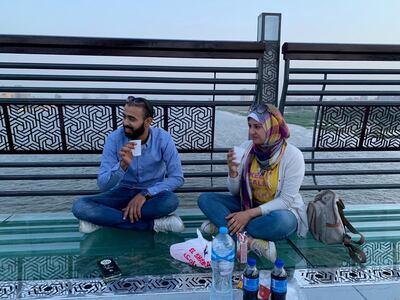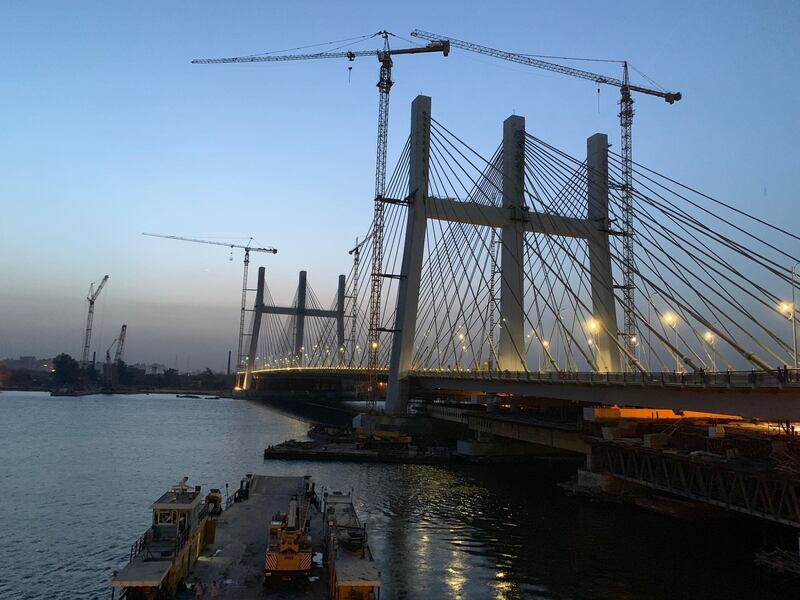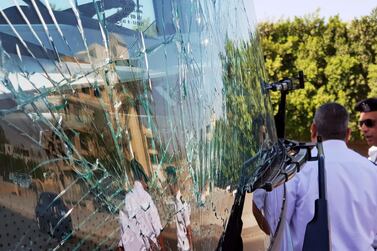"It's so beautiful here," 30-year-old Noureen said as she broke her dawn-to-sunset Ramadan fast while seated next to a friend on the glass footpath of Cairo's newest landmark, the world's widest suspended bridge.
President Abdel-Fattah El Sisi opened the "Long Live Egypt" bridge on May 15, making the imposing structure the latest mega project to be inaugurated by the Egyptian leader. Since taking office office five years ago, Mr El Sisi has embarked on a high-octane drive to upgrade the country's infrastructure and build new cities, including a new capital in the desert east of Cairo.
Some question his government's spending priorities, arguing that some of those multi-billion dollar projects could have waited or the money should have instead been spent on education or healthcare. But the president remains adamant that reliable and modern infrastructure was needed to meet domestic demand and attract investments. New cities, he argues, absorb increasing demand for housing as the population rapidly grows. In their entirety, he insists, the projects have created hundreds of thousands of jobs at a time when the economy was slumping amid the political instability and violence that followed a popular uprising in 2011.
In televised comments during the bridge's inauguration, Mr El Sisi said many of the projects that began under his rule would have been too unaffordable had he waited due to rising costs.
"Many in the [construction] companies told us that our hurry was unjustified, but we knew and appreciated that every project we finish saved us time, effort and money," he said.
That, he said, was particularly true of the six billion Egyptian pound (Dh1.3 billion) bridge, which is part of an elaborate network of roads and bridges linking the country's Red Sea resorts in the east across to the Mediterranean city of Alexandria northwest of Cairo.
That network, which includes 600 kilometres of roads and 16 kilometres of bridges, has cost 165 billion pounds (Dh36 billion), but would have cost three times that much had the construction been delayed, according to Mr El Sisi.
The project's executives claim the six-lane, 540-metre long bridge was completed in 32 months instead of the 42 months it would take for a similar structure to be completed elsewhere. Its width – 67.36 metres – earned it the tag of the world's widest cable-stayed, or suspended, bridge.
The new bridge is proving to be a big hit with Egyptians, daily attracting hundreds of curious visitors who are thrilled by walking on its glass footpath looking down at the Nile below.
Some visitors are too scared to walk on the glass, unlike Noureen and her friend Abdel-Rahman, 22, who sat on the glass one recent evening to eat the sunset meal, or iftar, while enjoying the majestic view of the Nile and a cool breeze.

Others that evening were doing the same, using the glass footpath as a Ramadan picnic site, despite the protestations of the dozens of policemen guarding the bridge. Many took advantage of the last few minutes before the call for sunset prayers rang out across the city to pose for photos or take selfies with the Cairo skyline in the background.
Some just stood still, hands on the fence, and gazed ahead toward the heart of Cairo.
"I was scared at first, but he [Abdel-Rahman] encouraged me. I like to be adventurous and break the barrier of fear," said Noureen of the glass footpath.
"I used to see this bridge everyday while it was being built because my commute to work goes past it. I dreamed of visiting it when it's finished and here I am," said Noureen as she ate a chicken sandwich washed down with a soda.
The peaceful atmosphere was helped by the thin traffic on the bridge. Perhaps it was because much of the city’s Muslim majority was at home to break their fast, though Noureen speculated that the bridge’s 20 Egyptian pound vehicle toll may have played a part.
“If I had to use the bridge everyday, I would look for an alternative route," she said.







